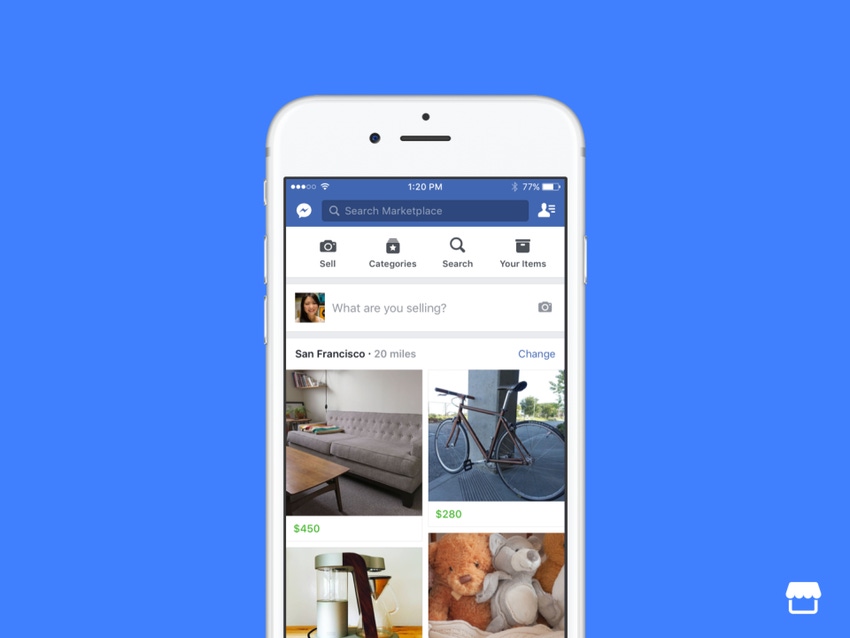Is there anything Facebook can’t do? With Zuckerberg seemingly not busy enough curing all the worlds’ diseases by the end of the century he’s decided to take on the competitive world of ecommerce.
October 4, 2016

Is there anything Facebook can’t do? With Zuckerberg seemingly not busy enough curing all the worlds’ diseases by the end of the century he’s decided to take on the competitive world of ecommerce.
The move should hardly come as a surprise to the industry as a number of Facebook’s 1.7 billion users have been using the platform as an informal car boot sale for years. Last year, buy and sell features were introduced to Facebook Groups and the company now claims more than 450 million people interact with the feature each month.
 The launch of Marketplace simply formalizes the idea, and offers the team yet another way to boost the already healthy advertising revenues. Better yet for the Facebook team, it’s not forcing its users to use something new on the site, its capitalizing on behaviour which is already present.
The launch of Marketplace simply formalizes the idea, and offers the team yet another way to boost the already healthy advertising revenues. Better yet for the Facebook team, it’s not forcing its users to use something new on the site, its capitalizing on behaviour which is already present.
The move will bring Facebook officially into competition with the likes of Amazon and eBay indirectly but also Craigslist and Gumtree directly. For the moment, the original connection between buyer and seller will be made through the Facebook platform, though payment will be taken offline.
This is very much the Craigslist/Gumtree model, built on the backdrop of buying off individuals as opposed to companies, its peer-to-peer and in-line with the social brand which the Facebook team has created. It’s friendly, helpful and focused on connections, but with presumably with substantially less sex-ads than Craigslist.
The main advantage here is the legitimacy of the seller. On Craigslist or Gumtree there can be a slight (or considerable) feeling of suspicion around the seller, but with Facebook the seller is always attached to a profile. While this does not guarantee legitimacy, it does create a higher level of trust and credibility.
The Amazon/eBay model could be viewed as more commercial, as payment can be made online making it easier for brands and businesses to utilize the platform. The two models are indirect competition, and while Facebook has not outlined intentions to move into this model so far, it would hardly be surprising. Quarterly revenues of $6.2 billion demonstrate the team is pretty good at sniffing out opportunities to generate advertising revenue, irrelevant as to where it comes from.
Which ecommerce platform would you now use to buy a bike?
Amazon (75%, 3 Votes)
Craigslist (25%, 1 Votes)
Facebook (0%, 0 Votes)
Gumtree (0%, 0 Votes)
Total Voters: 4
Facebook is also a company which is now concentrating on small to medium businesses to grow advertising revenues. The new strategy, outlined during the quarterly earnings call in July, highlighted over a third of small to medium businesses in the US do not have a website; Zuckerberg outlined his ambition for Facebook to be the digital platform for the digital era.
“So when we talk about our strategy (commercial search), I often talk about how when we develop new products we think about it in three phases,” said Zuckerberg. “First, building a consumer use case; then, second, making it so that people can organically interact with businesses; and then third, on top of that, once there’s a large volume of people interacting with businesses. Give businesses tools to reach more people and pay, and that’s ultimately the business opportunity.”
With this statement in mind, it may not be too long before the Facebook marketplace acts as a platform for the small and medium businesses, created a hybrid between Gumtree, Amazon, The Yellow Pages and Comparethemarket.com.
For 99% of the businesses and brands in the world, diversification into a new segment would be a terrifying and highly risky strategy. There are countless examples where it simply does not work, think Google into social media platforms or Donald Trump into universities or Virgin attempting to take on Pepsi and Coke with its own Cola product; not the greatest examples of successful ventures.
However, if there is a company which has high enough audience loyalty, strong enough brand credibility, clever enough management team, creative enough engineers and aggressive enough sales team to make a transition into new markets work, it is Facebook. If those in the ecommerce world aren’t worried, they certainly should be.
About the Author(s)
You May Also Like








.png?width=300&auto=webp&quality=80&disable=upscale)


_1.jpg?width=300&auto=webp&quality=80&disable=upscale)


.png?width=800&auto=webp&quality=80&disable=upscale)